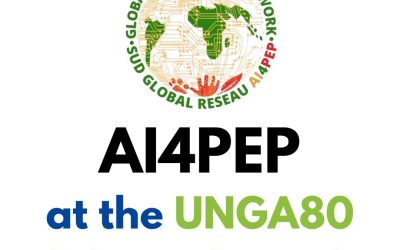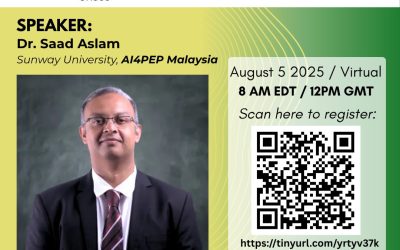On September 18, 2024, AI4PEP hosted a second vital panel at the UNGA Science Summit, exploring AI’s transformative role in healthcare within the Global South, focusing on Shaping the Future Together: A Collaborative Network in the Global South Leveraging Artificial Intelligence in Health for Sustainable Development.
On September 18, 2024, AI4PEP organized a second panel discussion as part of the Science Summit, titled “Shaping the Future Together A Collaborative Network in the Global South Leveraging Artificial Intelligence in Health for Sustainable Development.” This virtual event, held during AI4PEP’s ongoing initiatives to support sustainable development goals, provided a platform for experts from various regions to discuss AI’s role in enhancing healthcare systems within the Global South. The session featured two panel conversations that underscored AI’s transformative potential in healthcare, focusing on network effects, equitable access, and safe applications.
The first panel discussion was titled “AI Network Effects – Bridging Silos and Fostering Collaboration to Strengthen Health Systems and Advance SDG 3” which examined how AI fosters interdisciplinary collaboration, strengthens health systems, and addresses healthcare access challenges in the Global South. Panelists shared insights into how AI is breaking down traditional silos and facilitating partnerships across sectors to create integrated, accessible healthcare solutions.
This session highlighted real-world applications of AI that are improving health outcomes, from AI-driven diagnostic tools to networked health systems enhancing care access in underserved regions. The panelists discussed the importance of interdisciplinary collaboration, emphasizing that robust partnerships between healthcare providers, governments, and tech developers are essential to successfully scaling AI solutions. Challenges, such as data governance and infrastructure limitations, were addressed, and the discussion reinforced that regional contexts must inform the development and implementation of AI solutions to ensure equity and effectiveness in healthcare delivery.
The second panel discussion was titled “A future with AI for health: A Just, Equitable, and Safe Directions for the Global South.” The conversation focused on the ethical considerations and strategic approaches necessary for deploying AI responsibly within healthcare systems. This session encouraged forward-looking perspectives on AI’s role in creating an inclusive and equitable healthcare landscape.
The speakers highlighted the need for governance structures that prioritize accountability, community involvement, and the protection of patient data. The panel addressed how AI can empower healthcare workers, especially in regions facing shortages of medical professionals, by assisting in decision-making and improving public health monitoring. The discussion underscored that responsible scaling of AI could facilitate real-time data analytics, enhancing disease surveillance and health outcomes in areas prone to health crises.
The event concluded with insights into collaborative projects which emphasized AI’s role in addressing specific health challenges in diverse contexts across the Global South, highlighting how AI can be adapted to meet the unique needs of different regions, reinforcing the importance of culturally and contextually aware implementations. Such projects include the AI4PEP initiative in Morocco, which use AI to improve early disease detection and diagnosis. By leveraging AI for medical imaging and data analytics, these projects aim to address the shortage of specialists, especially in rural areas, helping healthcare providers make timely and accurate decisions. The AI4PEP initiative in the Philippines shared how AI is being integrated into the Philippines’ healthcare system to strengthen public health surveillance. Through predictive modelling and real-time data analytics, the country is enhancing its capacity to monitor and respond to infectious diseases, particularly in remote communities.
Prof. Jude Kong, executive director at AI4PEP, wrapped up the event by expressing appreciation for the panelists and attendees, reiterating AI4PEP’s commitment to fostering sustainable health partnerships in the Global South. This session provided actionable insights on how AI, when responsibly applied, can bridge gaps in healthcare access and create a more resilient future for communities across the Global South. These discussions collectively underscored the importance of ethical governance, cross-sector collaboration, and regional adaptability in leveraging AI for impactful health improvements.


